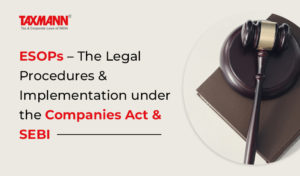ESOPs – The Legal Procedures & Implementation under the Companies Act & SEBI
- Blog|Company Law|
- 2 Min Read
- By Taxmann
- |
- Last Updated on 18 May, 2022

[2022] 138 taxmann.com 276 (Article)
Background
Companies often resort to introducing employee rewards through Employee Stock Option Scheme for company’s long-term growth and shareholder value creation and also to attract, retain and motivate the best available talent. In other words, it is a mechanism by which employees are compensated with increasing equity interests over time. Employee Stock Option Plan (ESOP) is an option to its employees to acquire Equity Shares of the company at a future date and at a pre-determined price. There is no limit on the quantum of ESOPs to be issued to employees.
Various modes of ESOP Plan
The various modes through which a ESOP plan can be implemented is through (a)ESOP (b) Employee Stock Purchase Plan (ESPP) (c) Stock Appreciation Rights-cash (SAR) (d)Stock Appreciation Rights -Equity (e) Restricted Stock Unit (RSU).
ESOP: It is a right offered by a company to its employees to take equity shares of a company at discounted price.
ESPP: It allows Employees to purchase the company’s shares, often at a discount from Fair Market Value.
RSU: Employee is awarded with the shares subject to fulfilment of certain underlying conditions. The conditions may be for e.g. Target or revenue and performance based.
SAR: In this Scheme, the employee gets the benefit in the form of cash /equity which is the difference between the date of grant and final exercise of options.
Terms under ESOP
Grant: Offering and grant of ESOP Options from the corporate entity to Employees.
Vesting: Vesting is a process through which employee becomes eligible to exercise options.
Exercise: Exercise is nothing but when an employee applies to the Company for getting the shares allotted.
Click Here To Read The Full Article
Disclaimer: The content/information published on the website is only for general information of the user and shall not be construed as legal advice. While the Taxmann has exercised reasonable efforts to ensure the veracity of information/content published, Taxmann shall be under no liability in any manner whatsoever for incorrect information, if any.

Taxmann Publications has a dedicated in-house Research & Editorial Team. This team consists of a team of Chartered Accountants, Company Secretaries, and Lawyers. This team works under the guidance and supervision of editor-in-chief Mr Rakesh Bhargava.
The Research and Editorial Team is responsible for developing reliable and accurate content for the readers. The team follows the six-sigma approach to achieve the benchmark of zero error in its publications and research platforms. The team ensures that the following publication guidelines are thoroughly followed while developing the content:
- The statutory material is obtained only from the authorized and reliable sources
- All the latest developments in the judicial and legislative fields are covered
- Prepare the analytical write-ups on current, controversial, and important issues to help the readers to understand the concept and its implications
- Every content published by Taxmann is complete, accurate and lucid
- All evidence-based statements are supported with proper reference to Section, Circular No., Notification No. or citations
- The golden rules of grammar, style and consistency are thoroughly followed
- Font and size that’s easy to read and remain consistent across all imprint and digital publications are applied



 CA | CS | CMA
CA | CS | CMA
